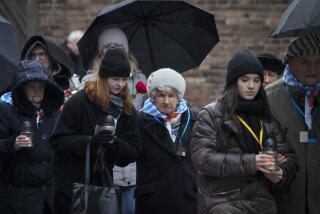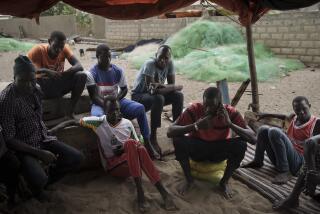Muslims Tell of Nine Months in Hiding in Bosnia
SLAVINOVICI, Bosnia-Herzegovina — The diary of Muhamed Smajic tells the story.
“This is a day I’ll remember all my life,” he wrote on July 11, 1995. “It has been really hard. Srebrenica could not survive.”
In the nine months that followed, Smajic and five other Muslim men who say they escaped the slaughter of Srebrenica and hid until now in the snowbound hills of eastern Bosnia wrote of their remarkable struggle to live long enough to be reunited with their families.
Last weekend, the six men emerged bedraggled, dazed and bearded, stunning relatives who had given them up for dead and adding their voices to the horrific chronicle of Srebrenica.
The U.N.-designated “safe area” fell to Bosnian Serb forces in July. An estimated 3,000 Muslim men were killed, and 8,000 more remain missing. Their bodies are presumed to be contained in the dozens of mass graves that international war crimes investigators began examining this month in an effort to build a case against Bosnian Serb leaders indicted by the war crimes tribunal at The Hague.
The conquest of Srebrenica, a disastrous humiliation for U.N. peacekeeping efforts, was reportedly directed by Bosnian Serb army commander Gen. Ratko Mladic and apparently led to the worst atrocity in Europe since World War II. Thousands of women from Srebrenica haunt refugee centers in Bosnia-Herzegovina, demanding to know what happened to their husbands, fathers and sons.
Smajic and his five companions say they eluded the massacre, fleeing over the bodies of neighbors and friends to reach a hiding place.
“We were stepping on bones,” Smajic, 26, said in a converted apartment building used now for refugee housing in this suburb of Tuzla. “It was body next to body. I was scared, but I had to walk over the bodies of fallen Bosnians.”
According to their accounts, the men foraged for food, ate grass and drank melted snow; they dug a cave-like bunker for shelter and camouflaged it with tree branches. They evaded Serbian patrols. Each day they marked the date, sometimes penning an entry in the diary.
“We just wanted to be able to look back and remember the hard times,” said another of the men, Dasan Oric, his feet and calves swollen and speckled with sores from the ordeal. “It is very easy to go crazy.”
Smajic and Oric were interviewed separately Tuesday. Their accounts cannot be verified independently and have been met with some skepticism by refugee-aid officials. Much of their story, however, is plausible, especially given Oric’s familiarity with the surroundings where he and the others say they hid. The joy exhibited by their relatives also seemed genuine.
“I had hope until the New Year,” said Oric’s wife, Tija, who fled Srebrenica with their two young daughters when the city fell. “But when I saw the mass graves, I lost hope of ever seeing my husband again.”
Throughout July, Smajic noted in the diary, “our food was apples, mushrooms, snails and nettles. . . . Everything that you thought you couldn’t do, now we were doing.”
By August, according to their accounts, Smajic and Oric--who had escaped Srebrenica separately and run the gantlet of Serbian ambushes--had hooked up and dug a 4-square-yard bunker in the side of a hill near Oric’s home village of Lehovici, which was looted and burned in the Serbian offensive. They were eventually joined by the four others, including a 15- and a 16-year-old, who had been furtively wandering the woods.
Through the autumn, they were able to find potatoes, tomatoes and other abandoned crops. But as winter descended, food became more scarce. On occasion they could steal food from empty homes, which is how they also obtained blankets, heavier clothing, an old wood-burning stove, even some pots and pans, according to Oric.
They would go on forays during the day and sleep in the bunker at night. Frequently, they said, they saw Serbs in the distance, tilling fields or working in villages.
In November, they used the diary to note the drafting of the Dayton, Ohio, peace accord that would end the war in Bosnia.
“I pray to God next year will be better,” wrote another of the men, Adnan Spahic.
With peace official, the men said, they wondered if it was safe to make a dash for Tuzla, the northeast Bosnian city held by government forces, but they opted instead to wait out the winter.
They said they kept track of world events by listening to a small radio they found, which they rigged up to a 12-volt alternator run by a pedal-operated spinning wheel that generated a small but sufficient amount of electricity.
In February, young Kemal Sadikovic, 15, entered a poem in the diary, an ode to a hero who left his mother and siblings behind. “Tears you will see in his eyes,” he wrote.
By the middle of March, the men and boys had decided to make a go for Tuzla, they said. One of the last entries in the diary, as they began what would be an 11-day hike to safety, was hopeful:
“It looks like our suffering is coming to an end.”
The men said they first passed an American army base as they approached Tuzla last weekend--but most were too afraid to approach it. Then, they said, they happened upon Bosnian government police and they realized they were in safe territory.
The police immediately gave them soup, tea and bread, the food they most coveted, they said. Their families were contacted, although the first news came to Oric’s wife when she saw him on television.
His eyes exhausted and his hair starting to turn white, Oric, 43, said he has been uneasy since reaching safety. He wakes up in the night, hourly, hallucinating that he is still in the bunker. Smajic too said he never felt as tired on the run as he does now.
“Even now I am nervous,” Oric said.
The Oric family was gathered in a comfortable lakefront home about six miles outside Tuzla. Dasan’s 60-year-old father is still missing from Srebrenica, as are his wife’s two brothers and three brothers-in-law.
Does the emergence of Oric, Smajic and the rest give new hope to other grieving Srebrenica families? As the war-crimes investigators make progress, evidence is steadily mounting to confirm the massacre that few doubt. Blindfolds, shell casings, human bones and Muslim identification documents have been found in fields that survivors said were execution sites.
Oric’s own sister-in-law, Kadefa Oric, sat quietly during the interview Tuesday, cuddling one of her three young daughters. She too has not seen her husband since the fall of Srebrenica.
“I am hoping,” she said. “I could not live without hope.”
More to Read
Sign up for Essential California
The most important California stories and recommendations in your inbox every morning.
You may occasionally receive promotional content from the Los Angeles Times.











